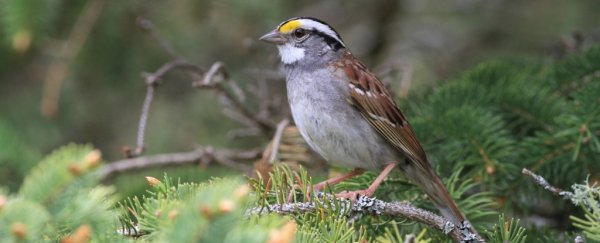White-throated sparrows in British Columbia are whistling a new tune and it's going viral across Canada.
What started as a minor change to a common song has now morphed into a continent-wide phenomenon before our very ears.
"As far as we know, it's unprecedented," says biologist Ken Otter from the University of Northern British Columbia, Canada.
"We don't know of any other study that has ever seen this sort of spread through cultural evolution of a song type."
When Otter first moved to western Canada in the late 1990s, he heard the white-throated sparrows (Zonotrichia albicollis) singing an unusual tune. Instead of sticking to the species' usual three-note finish, local sparrow populations were ending their tune on two notes.
Between 2000 and 2019, this small change has travelled over 3,000 kilometres (1,800 miles) from British Columbia (BC) to central Ontario, virtually wiping out a historic song ending that's been around since the 1950s at least.
No one knows what's so addictive about this new ending, or why it can't exist alongside the three-note variant, but scientists are trying to figure it out.
Thanks to citizen scientists, researchers were able to analyse the songs of 1,785 male white-throated sparrows, which were recorded from the 1950s onwards.
While it's not unusual for populations of sparrows and other birds to change their tunes, it usually remains a regional dialect. It certainly doesn't spread like the one from BC.
And yet, from Alberta, to Saskatchewan, to Manitoba, this unique ending crossed Canada's prairie provinces in record time.
"It could well be a "we haven't noticed it before"," admits Otter to ScienceAlert.
"Now that there is so many more songs from vast areas being uploaded each year, it is possible to start exploring whether this is a more general phenomenon in other species."
In 2004, the data show Alberta's sparrows were still trilling away with the triplet ending typical to the species. Ten years later, all the males in that region had shifted to a doublet ending.
By 2015, it had spread to central Ontario, completely supplanting the three-note ending in the northwest. By 2019, it had reached western Quebec, covering the entire western portion of the species' geographic range.
Altogether, that's a linear distance of nearly 3,300 kilometres.
"Within the regions where the doublet-ending song variant spread, it also completely replaced in the process," the authors write.
"To our knowledge, this is an unprecedented rate of song-type transition in any species of birds."
Using citizen science databases, like eBird and Xeno-Canto, the new study shows the songs heard on the wintering grounds tend to match up with where the sparrows are from.
"This concentration and intermingling of birds from large portions of the breeding range suggests that the spread of song variants among populations may be facilitated by song tutoring on the wintering grounds," the authors write.
Incidentally, there are reports that the white-crowned sparrows (Z. leucophrys) sometimes incorporates elements of other dialects during winter singing.
To test this idea, researchers attached geolocators - or what Otter calls 'tiny backpacks' - to 50 male sparrows in British Columbia. They then recovered the devices after the animals had migrated, some to the west and others to the east.
Several crossed the Rocky Mountains and entered a new breeding region, which could have feasibly spread the song's new ending to eastern populations.
"We know that birds sing on the wintering grounds, so juvenile males may be able to pick up new song types if they overwinter with birds from other dialect areas," says Otter.
"This would allow males to learn new song types in the winter and take them to new locations when they return to breeding grounds, helping explain how the song type could spread."
Why males end up adopting this new ending is still unclear. Otter says the ending might simply be compelling because it's unusual and unique. Like many other bird songs, however, it could have to do with females and their preferences.
"In many previous studies, the females tend to prefer whatever the local song type is," says Otter.
"But in white-throated sparrows, we might find a situation in which the females actually like songs that aren't typical in their environment. If that's the case, there's a big advantage to any male who can sing a new song type."
And it might be happening again. Researchers are currently watching a new song variant that has suddenly emerged in western sparrow populations and is rapidly spreading.
Perhaps this time, we can figure out why.
The study was published in Current Biology.
